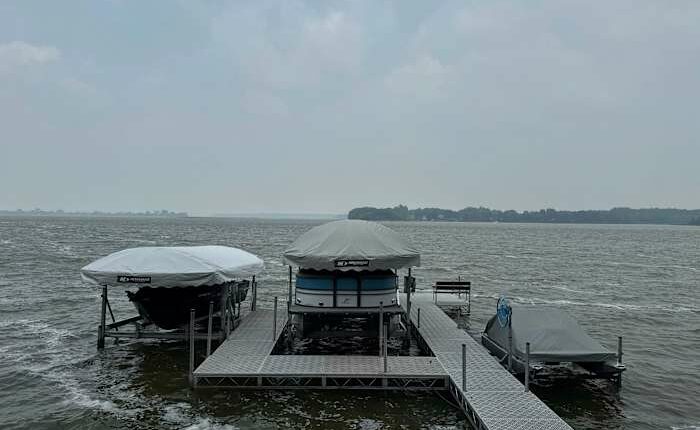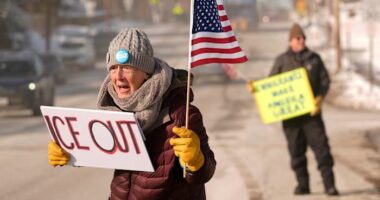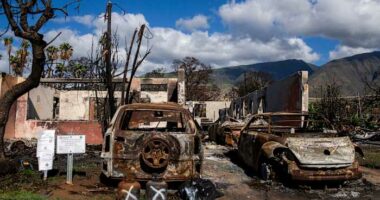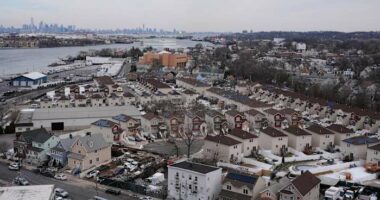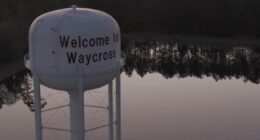Share this @internewscast.com

BISMARCK, N.D. – Large portions of the Upper Midwest on Saturday faced poor air conditions, caused by smoke drifting from Canadian wildfires. This affected the northern U.S. just as people were eager to enjoy outdoor activities such as visiting lakes and hiking trails.
The U.S. Environmental Protection Agency labeled air quality in most of Minnesota and parts of Montana, North Dakota, and Wisconsin as “unhealthy.” A section of North Dakota, which includes Theodore Roosevelt National Park and other tourist destinations, was categorized as “very unhealthy,” marking it as one of the areas with the poorest air quality in the country.
In Minnesota, Al Chirpich, the owner of the Hideaway Resort near Detroit Lakes, humorously remarked, “If you have a nice pork loin you can hang from a tree, it’ll turn into ham,” referencing the smoky conditions impacting the region where visitors usually enjoy fishing and water activities on the tree-lined Island Lake.
Normally there would be boats and jet skis all over, but on Saturday he couldn’t see a boat on the lake, where the smoke impaired visibility and curtailed his camper business. None of his 18 RV sites was occupied. His seven rental cabins drew a handful of customers.
“I suspect when the weather clears, we’ll be swamped again. Fourth of July, I had probably 20 boats here lined up at my docks, and today my boat is the only one,” Chirpich said.
The conditions started Friday, dragging smoke from the Canadian wildfires down to the surface, said National Weather Service Meteorologist Jennifer Ritterling, in Grand Forks. Periods of bad air quality are expected to last through the weekend in the region, she said.
Limiting time outdoors, keeping windows closed and running air purifiers are good ideas for people with lung conditions such as asthma and chronic obstructive pulmonary disease, and even healthy people, Ritterling said.
“Our summers up here are fairly short and so everyone wants to get out and enjoy them, and it’s a little frustrating when there’s this smoke in the air,” she said.
Fires in Canada prompt state of emergency for some
All of Manitoba is under a state of emergency due to the wildfires, which have led to 12,600 people evacuating their homes in the province. The fires in the central Canadian province have burned over 3,861 square miles (10,000 square kilometers), the most land burned in 30 years of electronic recordkeeping.
Under 1,000 people have evacuated their homes in Saskatchewan, where wildfires also continue to burn.
North Rim in Grand Canyon still closed
In Arizona, the North Rim in Grand Canyon National Park is still closed due to a 2.3 square-mile (6.1 square-kilometer) wildfire and another fire nearby on Bureau of Land Management land that has burned nearly 17 square miles (44 square kilometers).
In Colorado, Black Canyon of the Gunnison National Park remains closed due to a 4.4 square mile (11.3 square kilometer) wildfire burning on the South Rim of the park, known for its dramatic, steep cliffs. Crews have been fighting the fire on multiple sides to stop it from spreading.
The fires in and near both national parks led to evacuations of hundreds of people.
Chirpich, the Minnesota resort owner, said he has plans to go to Black Canyon of the Gunnison National Park on Thursday and is “a bit pensive about how that’s going to be there.”
“I’m going to leave one smokehouse for another, I guess,” he said.
Copyright 2025 The Associated Press. All rights reserved. This material may not be published, broadcast, rewritten or redistributed without permission.
